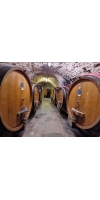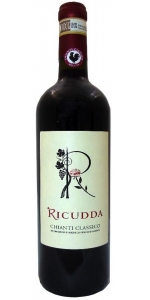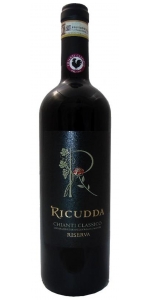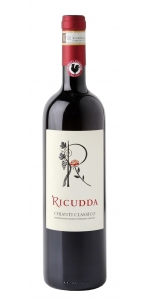Wine from Fattoria Ricudda

The Ricudda Farm is located along a secondary route of the ancient Via Francigena, which in ancient times was traveled by pilgrims who went from France to Rome and descended from the ridge of Castellina in Chianti towards the main routes of the Val D’Elsa.
It takes its name from the French Coude / Couder / Recoude, which has the meaning of “elbow, bend”.
The name of the farm can therefore be traced back to the "elbow" conformation of the farm land.
The Fattoria has been producing wine since the 15th century and is one of the oldest farms in the Chianti area. It is located in the municipality of Castellina in Chianti about halfway between Florence and Siena, at an altitude of about 360 m a.s.l. The farm and its grounds boast almost 800 years of history, from the first known acquisition a few years before 1300 by Bartolomeo di Grazia, a Florentine citizen of the time, who started production until our acquisition. The Squarcialupi family, the most powerful family in the history of Chianti, is also among the owners of the land. In 2016 the company
was acquired by the Bojola - Australi families with the aim of converting production towards a 100% organic product. 6 hectares of new vineyards were replanted, modern equipment was purchased and the old farm that houses the farm and farmhouse was renovated. The result is a production of high quality Chianti Classico with Sangiovese grapes and organic olive oil.
Ricudda IGT Toscana Canaiolo is made from 100% Canaiolo.
Intense ruby red with purple tints. Aromas of flowers and berries accompanied by sweet spices. Fresh and easy to drink, with intense fruity notes.
Wine is vinified in French oak barrels for 2 months. Then it is aged in concrete tanks for another 2 months.
After bottling, the wine is kept in bottle for an extra 3 months before it is release to the consumer.
The wine is produced with grapes from organic viticulture and is clarified without the use of products of animal origin.
To be combined with first and second courses based on meat, cold cuts, vegetables and fresh cheeses.
First courses with game, grilled meats, fresh and aged cheeses such as pecorino.
Intense ruby red color with purple tints.
On the nose, the wine shows some intense notes of red fruits, especially cherry and slight hints of oak.
In the mouth, it has a good structure, great softness and it is pleasant to drink. Predominant notes of red fruits, with slight spiciness.
Pair with first courses with game, grilled meats, fresh and aged cheeses such as pecorino.
Wine with great structure, intensity and complexity.
Intense aromas of toasted oak, ripe red fruits, accompanied by spices and balsamic notes.
Aged 24 months in Oak barrels from forrests in the center of France.
Pairs well with grilled meats, game meat and aged hard cheeses.
Ricudda Chianti Classico Riserva 100% Sangiovese.
Deep ruby red color.
The wine shows an intense and persistent bouquet, with notes of berries and spices such as licorice and black pepper. Well-harmonized hints of oak.
In the mouth, it is well structured and balanced, complex, persistent with notes of red fruits and spices such as black pepper and licorice.
Pair with grilled red meats, steak, game of hair and feather, stewed and roasted, aged cheeses hard like pecorino.
Ricudda IGT Toscana Canaiolo is made from 100% Sangiovese.
Intense ruby red with purple tints. Aromas of flowers and berries accompanied by sweet spices. Fresh and easy to drink, with intense fruity notes.
To be combined with first and second courses based on meat, cold cuts, vegetables and fresh cheeses.
First courses with game, grilled meats, fresh and aged cheeses such as pecorino.
- back
Selected Options
Wineries
Categories
Pricing
Countries
Regions
Grape Types
Wineries
Organic/Free Shipping
An inky purple hue, the wine offers fragrant aromas of ripe, brambly berries and plums, edged in notes of walnut husk and cedar. The palate explodes with intense flavors of redcurrant and cherry, fanning out in a broad, silky wave that mingles vibrant fruit flavors with accents of espresso, chocolate and graphite, and lingers on the long finish.
Review:
A new project from the Indelicato family (Black Stallion Winery) and consultant Thomas Rivers Brown, the 2019 Cabernet Sauvignon is a ripe, full-bodied effort, loaded with scents of cherries, baking spices and dark chocolate accented by subtle herbal shadings. It's supple and expansive on the palate, culminating in a long, mouthwatering finish that combines a touch of warmth and a dusting of silky tannins. It should drink well for more than a decade.
- Robert Parker's Wine Advocate 95 Points
Le Jade Picpoul de Pinet is made from 100% Picpoul de Pinet
Pale straw color. Delicate white flower, citrus and juicy pear aromas. Fresh, crisp, and bright acidity with mineral and saline accents. Well-balanced and easy-drinking.
A refreshing treat laced up with snappy food-friendly acidity.
Picpoul Le Jade makes a classic match with oysters on the half shell and goes very well with exotic food in general. Picpoul means lip-smacking good.
SOIL : Clay and limestone soil just a few kilometres from the reputed Etang de Thau (salted water lagoon) overlooking the Mediterranean town of Sète.
VINIFICATION : Grapes are harvested at 12°- 13° maturity
Skin maceration for several hours
Selection of drained juice after undergoing pneumatic pressure.
Cold double decantation.
Thermoregulated fermentation at 16°C
No malolactic fermentation.









